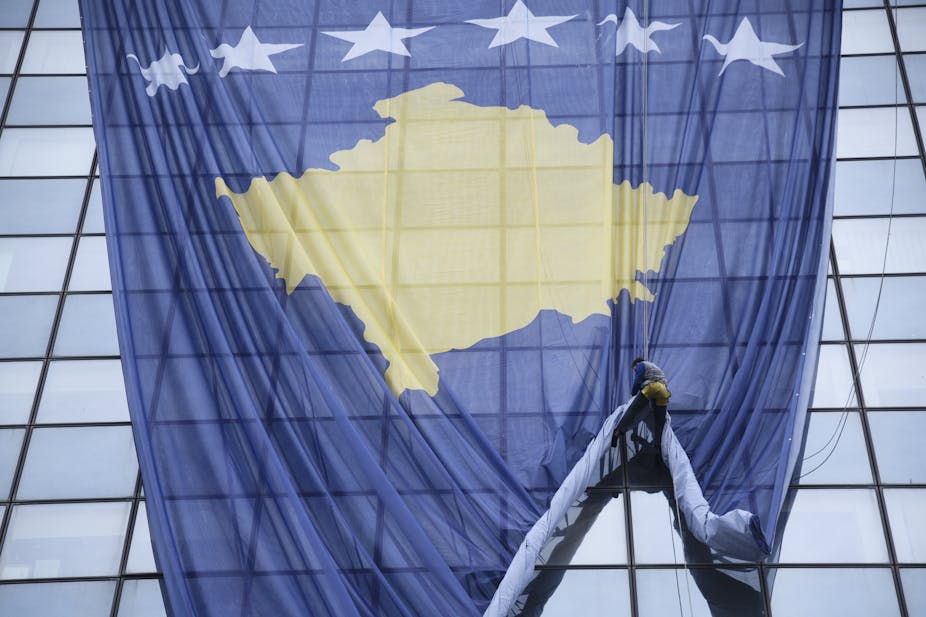As Kosovo prepared to celebrate the ten-year anniversary of its declaration of independence, it was hit with a bitter blow: on February 6, the EU Commission released its strategy for the accession of the Western Balkans, which made it clear that Kosovo’s prospects of joining the EU are remote. Reeling from high unemployment, perennial corruption and a series of recent crises, the people of Kosovo badly needed a boost – instead the EU’s strategy delivered a slap in the face.
Given Kosovo is a small, landlocked country with limited natural resources, membership of the EU has naturally always been one of its top priorities. In its 2008 declaration of independence, Kosovo expressed its wish “to become fully integrated into the Euro-Atlantic family of democracies” and “our intention to take all steps necessary to facilitate full membership in the European Union”.
Kosovo’s population is the most keen to join the EU of any in the the Western Balkans, with 90% in favour; in Serbia, only 26% support membership. Kosovars are also exceptionally hopeful about membership, with 37% convinced their country will probably join the EU by 2020. Yet despite its people’s high hopes, the country’s chances of joining have not improved since 2008.
At the 2003 Thessaloniki Summit, the EU reiterated “its unequivocal support” to the Western Balkans, and declared: “The future of the Balkans is within the European Union.” But, since then, only Croatia has joined. The commission’s recent report on the region suggests that Serbia and Montenegro may be ready to join in 2025 and it is encouraging but decidedly vague about the prospects of Albania, Macedonia and Bosnia-Herzegovina. Kosovo, it says: “has an opportunity for sustainable progress through implementation of the Stabilisation and Association Agreement and to advance on its European path once objective circumstances allow”. Those opaque words will raise few people’s spirits.
Jumping through hoops
One of the major barriers to Kosovo’s membership is the intransigence of other European states. Five EU members still do not recognise Kosovo’s independence: Greece, Slovakia, Cyprus and Romania show no sign of softening – and Spain’s opposition has hardened thanks to recent events in Catalonia.
Full membership would also demand that Kosovo accede to various unwelcome demands from abroad. These include a new border demarcation with Montenegro, a normalisation agreement with Serbia and, at the behest of Kosovo’s five powerful Western sponsors – the so-called Quint – its co-operation with the Specialist Chambers established to investigate criminality perpetrated by the KLA during the conflict with Serbia.
It feels to many like Kosovo is being asked to jump through hoops just to facilitate the membership ambitions of its neighbours and the self-image of its external patrons. The fact that Kosovo is the only Western Balkan nation whose citizens still require a visa to travel to the Schengen area is a particularly acute source of frustration.

All told, Kosovo’s celebrations of a decade of independence are tinged with ambivalence, if not despair. To be fair, the news isn’t all bad: since 2008, there has been notable progress on a range of social issues, and the country’s civil society is developing fast. Kosovo has joined the World Bank and the IMF – and earlier this month finally got to use its own telephone dialling code. Kosovo has also been admitted to UEFA, FIFA and the International Olympic Committee.
But its bids to join Interpol and UNESCO both failed and its application to debut at the 2018 Eurovision Song Contest was also refused. International recognition of Kosovo has also seemed to be going into reverse of late; Serbia is trumpeting mixed signals from a number of states – among them Guinea-Bissau, Suriname and Egypt – as evidence that the tide is turning in Belgrade’s favour. Even the vice-chancellor of Austria, which does currently recognise Kosovo, recently suggested that this is “a matter for Serbia alone”.
Who’s to blame?
Kosovo declared independence from Serbia unilaterally and, as such, its independence has always been contentious. It is also hardly a model EU candidate state – it suffers from endemic corruption, cronyism and organised crime and, for all the emphasis on “multi-ethnicity” in the 2008 constitution, it remains sharply divided along ethnic lines. The education system is notably poor and, according to the World Bank, while Kosovo’s economic growth has outperformed its neighbours: “the current growth model relies heavily on remittances to fuel domestic consumption”.
Kosovo’s assorted problems are by no means unique. But even though Kosovo has been afforded an unparalleled degree of support by Western states – and indeed the EU – since Belgrade’s rule was suspended in mid-1999, it simply has not made the progress its external supporters promised.
Kosovo itself is not to blame for this. Its key sponsors – the very states who actively encouraged it to unilaterally declare independence – have for too long tolerated, and at times facilitated, the activities of a corrupt elite. They have periodically engaged in their own brand of mismanagement and corruption, and made promises they were in no position to keep.
Kosovo’s current predicament is therefore an indictment of the Western powers who have intervened to “help” it. And the costs of their failures are now being borne by Kosovars themselves.

